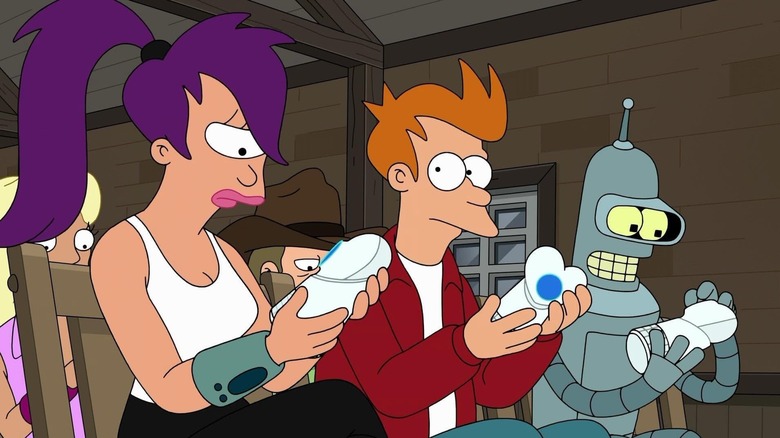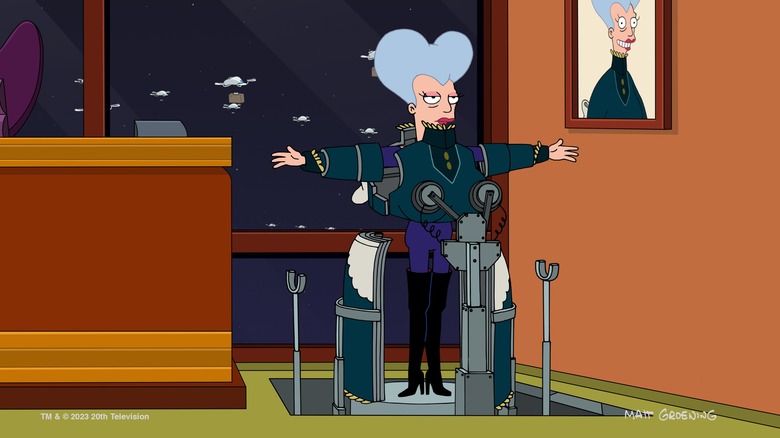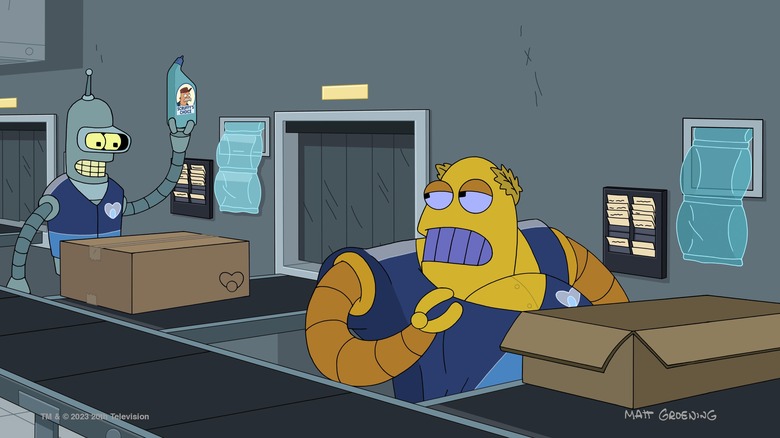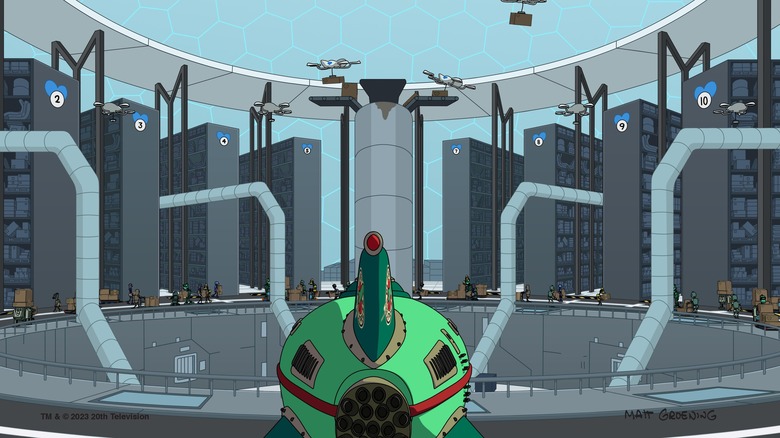In The Midst Of A Historic Industry Strike, Futurama Season 11 Makes The Case For Unions
This post contains spoilers for the latest episode of "Futurama" season 11.
If an animated sitcom goes on long enough, it will inevitably make an episode about unions. "The Simpsons," for instance, delivered a classic in season 4 with "Last Exit to Springfield," in which Homer ends up leading a union strike that shuts down the power plant. It's the episode that gave us the absolute banger that is Lisa's pro-union folk song, as well as that delightful montage of Mr. Burns and Mr. Smithers trying and failing to run the power plant by themselves. The world runs best when workers are properly compensated, the episode argues, even when those workers are as incompetent as Homer J. Simpson.
Even "South Park," with its tendency towards reactionary "both sides bad" social commentary, went unabashedly pro-union with its season 22 entry "Unfulfilled." In that episode, the town gets taken over by Amazon and the characters engage in a high-stakes, high-energy fight against Jeff Bezos. It spouts pro-worker rhetoric with only the tiniest whiffs of irony; it's a far improvement from its season 12 episode "Canada on Strike," which was basically a mean-spirited, 22-minute long mockery of the 2007 writer's strike. Showrunners Trey Parker and Matt Stone have had a lot of bad takes over the years, but when it comes to supporting unions, they've improved a lot.
The latest episode of "Futurama," titled "Related to Items You've Viewed," also takes aims at Amazon, as its stand-in Momazon drives all the smaller delivery businesses into bankruptcy. Admittedly, the jokes about the drones are a little played out, and the reference to peeing in bottles feels like it would've hit better back in 2018. The episode's a collection of references to well-known, long-mocked complaints, without much of the righteous anger that makes a pro-union episode so vital. Still, there's a lot to love here.
The return of a beloved villain
In what should come as no surprise to any longtime "Futurama" fan, Momazon is being run by Carol Miller, aka Mom, the evil villain who's constantly revealed to be responsible for most of this world's problems. She's this show's version of Mr. Burns, a rich elderly character who rarely directly interacts with the other main characters, but who nevertheless constantly interferes in their lives, often without them even realizing it. The difference here is that there's been a thousand years for wealth inequality to grow even more rampant, so Mom's dastardly schemes aren't confined to just one town, but to the entire planet. It takes until season 6 for Burns' schemes to escalate to him blocking out the sun over Springfield; Mom is already trying to get her robots to take over the whole world by season 2 in her show.
Of course, Mom isn't always the villain. Whereas "Futurama" usually uses the head of Richard Nixon as the figurehead for whatever political issue it's satirizing, Mom is mainly put in charge of whatever parody corporation is currently making the headlines in the real world. Early into the show's Comedy Central run, they basically made her the head of Apple, selling her EyePhones (ha, get it?) to billions of sheep-like customers. This also turns out to be part of a plan even eviler than encouraging smartphone addiction; she uses the new technology to create over a million tech-induced zombies, and as far as we can tell she gets away with it with zero repercussions. It's a funny, deliberately anti-climactic ending, one that only reinforces just how corrupt the world of "Futurama" is. The ultra-rich can do whatever they want all the time, and the most anyone else can do is ask them to stop. (Every once in a while, they'll listen.)
AI? No thank you
The main strength of this latest episode, the thing that was understandably missing in those pro-union episodes from "The Simpsons" and "South Park," is how AI is taken a bit more seriously. When Mr. Burns tried to get a bunch of robots to run the power plant, it was a disaster because that was 1993 and robot sentience was a long way off; but now it's 2023, and AI is able to do a passable job at seeming sentient to the average person. The whole idea behind Bender's character, a guy who's technically a machine but who's got plenty of genuine emotions and opinions, is a little less ridiculous today.
So it's not a surprise to see Mom exclusively hiring robots to run her business. They don't need to be paid and they don't need breaks, so from a cold-hearted business perspective it seems like a no-brainer. But of course the robots start taking over the universe, and Mom refuses to stop it because it's technically still making her money. As far as Mom knows, these robots are about to doom all of humanity, herself included, but she lets them keep going anyway. Just like with corporations today, short-term profits override any obvious harm down the road.
In light of the ongoing writers' strike, this all feels pretty timely and important. It seems clear that many studio execs want to replace human writers with machines for the short-term profit, even though it seems unlikely that audiences will still be turning out to see movies once they're largely written by soulless, unoriginal drones. "Related to Items You've Viewed" is far less specific to the writers' strike than the season premiere, but the immediate backfiring of the 100% robot workforce sure does play like a pro-WGA message (although yes, the episode was written long before the current strike began.)
Convenience above all else
Of course, humanity doesn't actually get wiped out, because that would end the show; instead, the robots running Momazon successfully encompass the entire universe without harming anyone inside of it. So the episode ends with a collective shrug from all the characters; yes, the Amazon parallel company has taken over the world in the end, but things will basically be the same going forward. The show will likely throw in some fun Momazon gags in later episodes to reward long-term viewers, just like it kept casually having characters use their EyePhone technology ever since "Attack of the Killer App."
While it would've been nice if the episode had taken a stronger, more passionate stance on the episode's events, that sort of aloof cynicism on display here is perfectly on brand for the series. The world of "Futurama" is one where every problem in our current timeline has been taken to its extreme logical endpoint, and the humor is mined from the absurdity of the characters just going about their mundane existence anyway. Even when there are suicide booths on every corner, where corporations are advertising to you in your dreams, when Amazon has successfully gained a monopoly on the delivery market to the point where it literally encompasses the entire universe, people just go about their lives like usual.
The unions may be destroyed in this universe and Mom once again has faced zero consequences for her greed, but at least the characters still get quick, convenient shipping, so it's pretty much a happy ending. Hopefully in our world, our standards stay a little higher.



